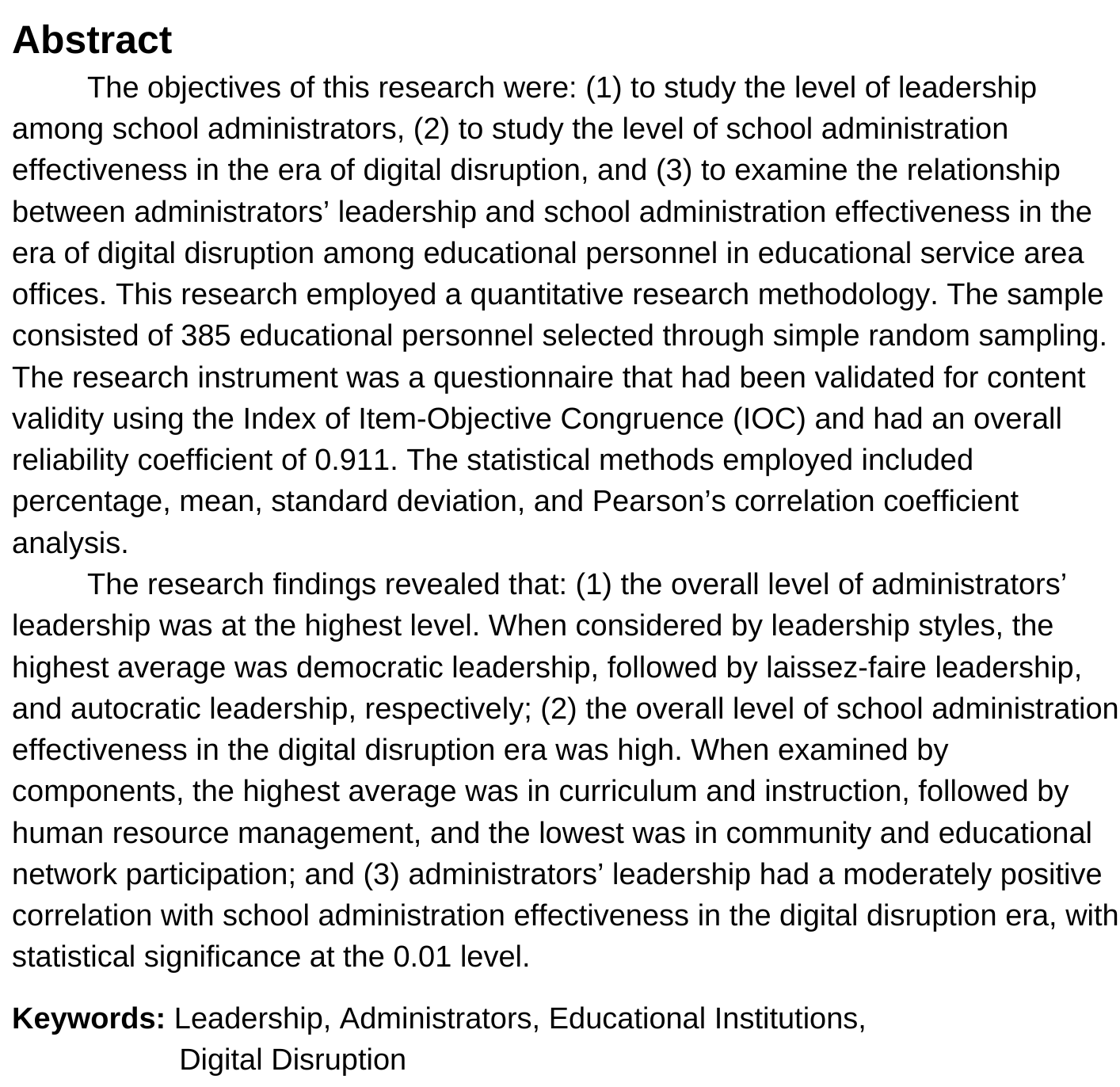Executive leadership and the effectiveness of educational institution administration in the digital disruption era of educational personnel, Office of the Basic Education Commission
Keywords:
Leadership, Administrators, Educational Institutions, Digital DisruptionAbstract
The objectives of this research were: (1) to study the level of leadership among school administrators, (2) to study the level of school administration effectiveness in the era of digital disruption, and (3) to examine the relationship between administrators’ leadership and school administration effectiveness in the era of digital disruption among educational personnel in educational service area offices. This research employed a quantitative research methodology. The sample consisted of 385 educational personnel selected through simple random sampling. The research instrument was a questionnaire that had been validated for content validity using the Index of Item-Objective Congruence (IOC) and had an overall reliability coefficient of 0.911. The statistical methods employed included percentage, mean, standard deviation, and Pearson’s correlation coefficient analysis.
The research findings revealed that: (1) the overall level of administrators’ leadership was at the highest level. When considered by leadership styles, the highest average was democratic leadership, followed by laissez-faire leadership, and autocratic leadership, respectively; (2) the overall level of school administration effectiveness in the digital disruption era was high. When examined by components, the highest average was in curriculum and instruction, followed by human resource management, and the lowest was in community and educational network participation; and (3) administrators’ leadership had a moderately positive correlation with school administration effectiveness in the digital disruption era, with statistical significance at the 0.01 level.
References
จักรกฤษณ์ โพดาพล. (2563). การจัดการเรียนรู้ออนไลน์ : วีถีที่เป็นไปทางการศึกษา. [ออนไลน์]. แหล่งที่มา : http://slc.mbu.ac.th/wp-content/uploads/2020/06/การจัดการเรียนรู้ออนไลน์-ดร.จักรกฤษณ์-โพด.pdf.
ชีวิน อ่อนละออ และคณะ. (2563) ภาวะผู้นำยุคดิจิทัล สำหรับนักบริหารการศึกษา. วารสารวิทยาลัยบัณฑิตเอเชีย, 10(1), 108-119.
ต้องลักษณ์ บุญธรรม. (2559). การเป็นผู้นำยุคเศรษฐกิจดิจิทัลกับการพัฒนาที่ยั่งยืนขององค์กรทางการศึกษา.วารสารวิชาการครุศาสตร์อุตสาหกรรม พระจอมเกล้าพระนครเหนือ, 7(1), 217-225.
ในตะวัน กำหอม. (2559). การวิจัยทางการศึกษา.เล่ม 1. กรุงเทพฯ : วิทยาลัยทองสุข. โรงพิมพ์ทีคอม.
พระมหาสมบูรณ์ สุธมฺโม. (2557). บทบาทของผู้บริหารในการพัฒนาคุณภาพการศึกษา. วารสารครุศาสตร์ปริทรรศน์ฯ, 1(1), 89-102.
ปะราลี อร่ามดวง. (2563). การพัฒนากลยุทธ์การบริหารวิชาการโรงเรียนมัธยมศึกษาตามแนวคิดการเสริมสร้างความไว้วางใจ. ดุษฎีนิพนธ์ตามหลักสูตรครุศาสตร์ดุษฎีบัณฑิต สาขาวิชาการบริหารการศึกษา. คณะครุศาสตร์ จุฬาลงกรณ์มหาวิทยาลัย.
รัฐนันท์ รถทอง และมลรักษ์ เลิศวิลัย. (2564). ภาวะผู้นำดิจิทัลของครูโรงเรียนเทศบาลบ้านสามกอง อำเภอเมือง จังหวัดภูเก็ต. Journal of Roi Kaensarn Academi, 6(11), 223-234.
รัตนบงกช นิพัฒน์ศิริผล. (2563). การศึกษาความสัมพันธ์ภาวะผู้นำเชิงพฤติกรรมของผู้บริหารสถานศึกษากับแรงจูงใจในการปฏิบัติงานของครู สังกัดสำนักงานเขตพื้นที่การศึกษาประถมศึกษาเชียงราย เขต 3. การค้นคว้าอิสระศึกษามหาบัณฑิต : มหาวิทยาลัยพะเยา.
วิชาญ เหรียญวิไลรัตน์. (2566). ความสัมพันธ์ระหว่างภาวะผู้นำทางวิชาการกับประสิทธิผลการบริหารจัดการ สถานศึกษาในยุคดิจิทัลดิสรัปชันของโรงเรียนมัธยมศึกษาสังกัดสำนักงานเขตพื้นที่การศึกษามัธยมศึกษาปทุมธานี. หลักสูตรศึกษาศาสตรมหาบัณฑิต สาขาวอิชาการบริหารการศึกษา : วิทยาลัยทองสุข
สิทธิศักดิ์ มนต์ฤทธานุภาพ (2565). เรื่องลักษณะภาวะผู้นำต่อความมีจิตอาสาในการบริหารสถานศึกษาของบุคลากรทางการศึกษา วิทยาลัยเกษตรและเทคโนโลยีนครราชสีมา อำเภอสีคิ้ว จังหวัดนครราชสีมา. หลักสูตรศึกษาศาสตรมหาบัณฑิต สาขาวิชาการบริหารการศึกษา : วิทยาลัยทองสุข
สุทธิชา สมุทวนิช. (2563). พฤติกรรมผู้นำของผู้บริหารที่ส่งผลต่อแรงจูงใจในการปฏิบัติงานของครูในสถานศึกษาพื้นที่จังหวัดกาญจนบุรี สังกัดสำนักงานเขตพื้นที่การศึกษามัธยมศึกษา เขต 8. วิทยานิพนธ์ครุศาสตรมหาบัณฑิต สาขาวิชาการบริหารการศึกษา. บัณฑิตวิทยาลัย : มหาวิทยาลัยราชภัฏหมู่บ้านจอมบึง.
สุภวัช เชาวน์เกษม, วิสุทธิ์ วิจิตรพัชราภรณ์ และสุดารัตน์ สารสว่าง. (2563). ความสัมพันธ์ระหว่างภาวะผู้นำยุคดิจิทัลของผู้บริหารสถานศึกษากับประสิทธิผล โรงเรียนสังกัดสำนักงานเขตพื้นที่การศึกษามัธยมศึกษา เขต 1. วารสารการจัดการการศึกษาและนวัตกรรม คณะศึกษาศาสตร์ มหาวิทยาลัยเกษตรศาสตร์, 3(3), 85-99.
Krejcie, R.V. and Morgan, D.W. (1970). Determining Sample Size for Research Activities. Educational and Psychological Measurement, 30(3), 607-610.
Rovinelli, R. J. & Hambleton, R. K. (1977). On the use of content specialists in the assessment of criterion-referenced test item validity. Dutch Journal of Educational Research, 2(2), 49–60.

Downloads
Published
How to Cite
Issue
Section
License
Copyright (c) 2025 Institute of Sufficiency Journal

This work is licensed under a Creative Commons Attribution-NonCommercial-NoDerivatives 4.0 International License.



